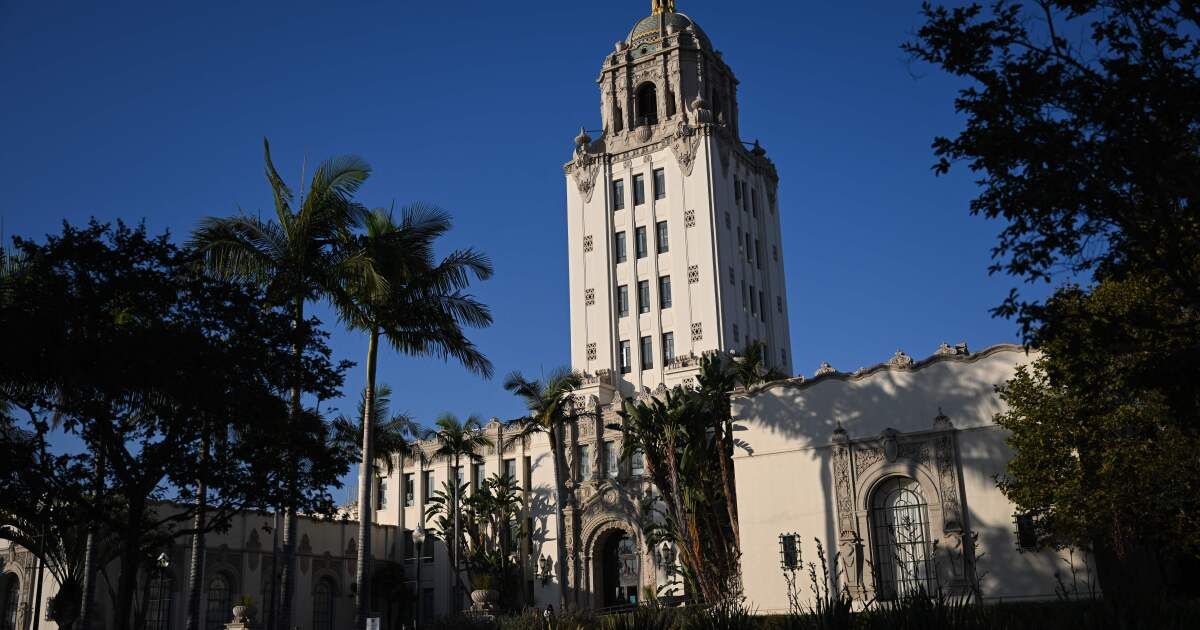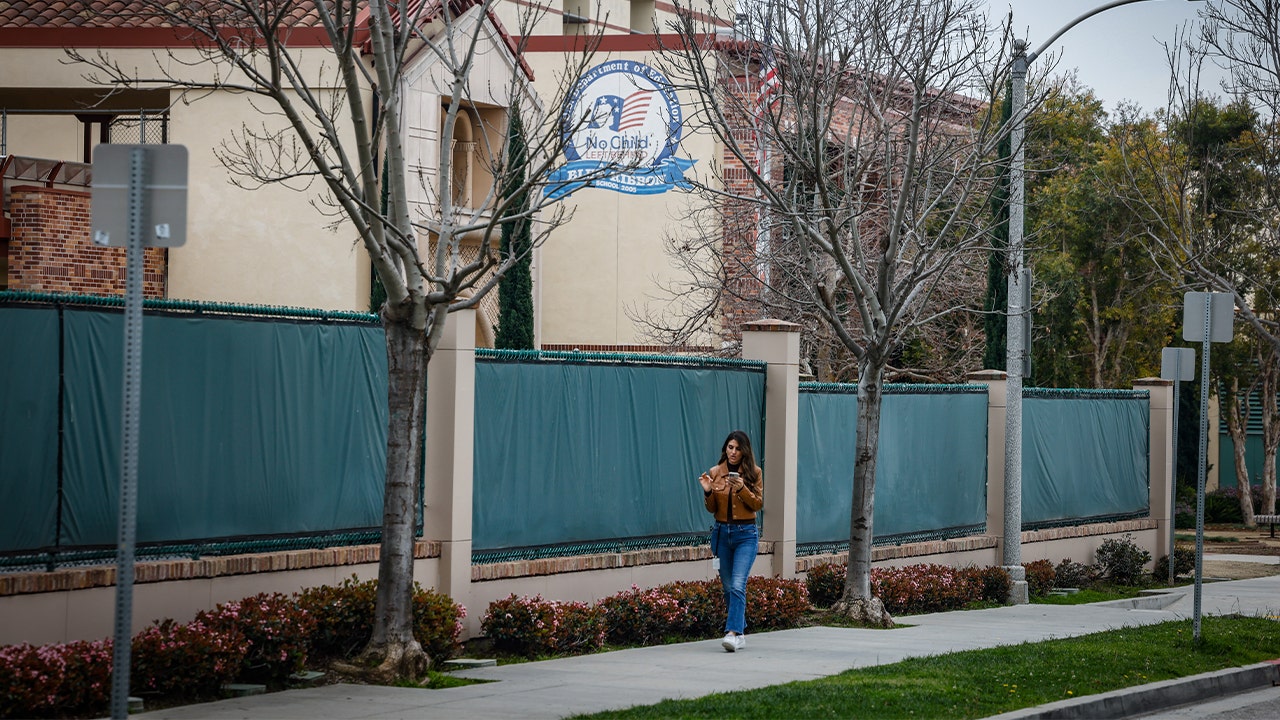California officials are tightening the screws on the city of Beverly Hills, where approval of a new hotel and apartment complex is moving too slowly for state housing chiefs and the governor.
The Lightning Rod is a planned mixed-use development near Wilshire Boulevard that has been submitted under a state law intended to force cities to add more housing, whether they like the proposals or not.
The 19-story building on Linden Drive, designed by local developer Leo Pustilnikov, would be large by Beverly Hills standards and include a 73-room hotel and restaurant on the first five floors. Plans call for the upper floors to contain 165 apartments, including 33 units reserved for rental to low-income households.
So far, the project has failed to pass muster among city planning leaders, who say Pustilnikov has not provided all the details about the project that the city requires to consider approving it.
Pustilnikov has pioneered a novel interpretation of a state law known as “builder's remedy“to pressure cities to allow development projects on a size and scale that would otherwise be prohibited by zoning regulations.
As part of their efforts to address California’s housing shortage and homelessness crisis, lawmakers recently strengthened the law, giving developers leverage to push through large proposals as long as they set aside a percentage for low-income residents.
Last month, the state Department of Housing and Community Development backed Pustilnikov in a “notice of violation” to the city, saying he was violating state housing laws by delaying the project.
“The City Council should reverse its decision and direct city staff to process the project without further delay,” the state notice said, referring to a council vote in June to delay the approval process.
Gov. Gavin Newsom weighed in with a statement, saying the city is violating the law by “blocking” the proposal and referring to opponents of the project as NIMBYs, a loaded acronym that stands for “not in my backyard” and refers to homeowners who resist development projects in their neighborhoods.
“We cannot solve homelessness without addressing the housing shortage,” the governor said. “Now is the time to build more housing, not give in to the demands of NIMBYs.”
Beverly Hills was already facing pressure to approve the Linden project before the state's letter. In June, Californians for Homeownership, a nonprofit affiliated with the California Association of Realtors, sued the city in Los Angeles County Superior Court for failing to move forward with the development.
Some residents of the neighborhood south of Wilshire Boulevard are outraged by the scale of the project, which aims to fill a parking lot at 125-129 S. Linden Drive, between a five-story office building and low-rise apartment buildings.
“None of us are opposed to affordable housing,” said Kenneth A. Goldman, president of the Southwest Beverly Hills Homeowners Association, but “you don’t have to be a NIMBY to say that’s totally out of line.”
It would be nearly four times taller than the five-story limit the city has on file and could threaten the neighborhood's “quiet lifestyle,” Goldman said. The construction period would be “hell,” he added.
The city has until Sept. 20 to respond to state housing officials and said in a statement that the delay was partly due to Pustilnikov changing the original proposal, which was exclusively residential, to include the hotel. It’s a change that could represent a financial hit for the developer in a tourist-friendly city, where getting permission to build a new hotel is a difficult task.
Last year, Beverly Hills voters decided to rescind City Council approval of an ultra-opulent hotel called the Cheval Blanc on the edge of Rodeo Drive after French luxury retailer LVMH spent millions of dollars planning the project.
Regarding the Linden Drive proposal, the city said in a statement: “The project has not been rejected.”
“What was originally presented as a purely residential project has now been transformed into a 73-room hotel and restaurant project with 35 fewer residential units, including a reduction of 7 affordable units,” he said.
When the application is complete, the city said, a public hearing will be held, followed by a review by the Planning Commission and possible approval by the City Council.
That process may be complicated by Pustilnikov's stated intention to sell his stake in the Linden Drive property as part of a Chapter 11 bankruptcy proceeding involving another of his real estate projects.
In 2018, Pustilnikov purchased a 50-acre parcel of land on the Redondo Beach coast where an abandoned power plant sits. The property is controlled by entities owned by Pustilnikov and a business partner, Ely Dromy. Using the builder’s repair act, the pair have pushed a massive mixed-use project for the site with 2,700 apartments as its centerpiece. In court documents, Pustilnikov estimates the development, if completed, would be worth $600 million.
The effort has been hampered by disputes with the city of Redondo Beach, the California Coastal Commission and AES Corp., which owns the power plant. In late 2022, AES threatened to seize Pustilnikov. To prevent that, one of the entities that owns the site filed for bankruptcy.
In a recent filing, Pustilnikov and Dromy said they will sell the Linden property for $27.5 million to help preserve their ownership of the power plant site.
However, a representative for Pustilinkov, Adam Englander, said in a statement that this is not necessarily the case.
Instead, more investors may be attracted to the Redondo Beach property and a developer with experience in luxury hotels may become a partner in the Linden project, Englander said.
“It is not anticipated,” Englander said, that the Linden project “in its current form will be sold prior to completion.”
Pustilnkov has submitted plans to build about 3,500 apartment units — 700 of them for low-income people — in a dozen projects in Beverly Hills, Redondo Beach, Santa Monica and West Hollywood under the developer’s plan. The Linden project is one of seven he is planning in Beverly Hills alone.
The developer's solution offers few avenues for municipalities to reject the projects, but because it has not been legally tested and separate state environmental laws still apply, the projects are not a safe bet. None of Pustilnikov's proposals have been approved.
Cities are subject to the law if they do not have state-approved plans for future growth. Every eight years, The state requires communities to design a zoning plan. to accommodate a specific number of new homes, including those reserved for low- and moderate-income families.
In the current eight-year cycle, Beverly Hills has struggled to get a plan approved. Elected officials and residents opposed the city's requirement to make room for 3,104 homes, saying doing so would irrevocably change the character of the community.
The city missed several deadlines and was sued by Californians for Homeownership. In December, a Los Angeles County Superior Court judge ruled that Beverly Hills could no longer issue any building permits, including those for swimming pools, kitchen and bathroom remodels and other renovations, due to its noncompliance.
The city appealed the ruling and continued to process permits in the meantime, but the decision raised alarm among civic leaders. In May, The state approved a revised housing plan for Beverly Hills, ending the threat of a permit moratorium.












